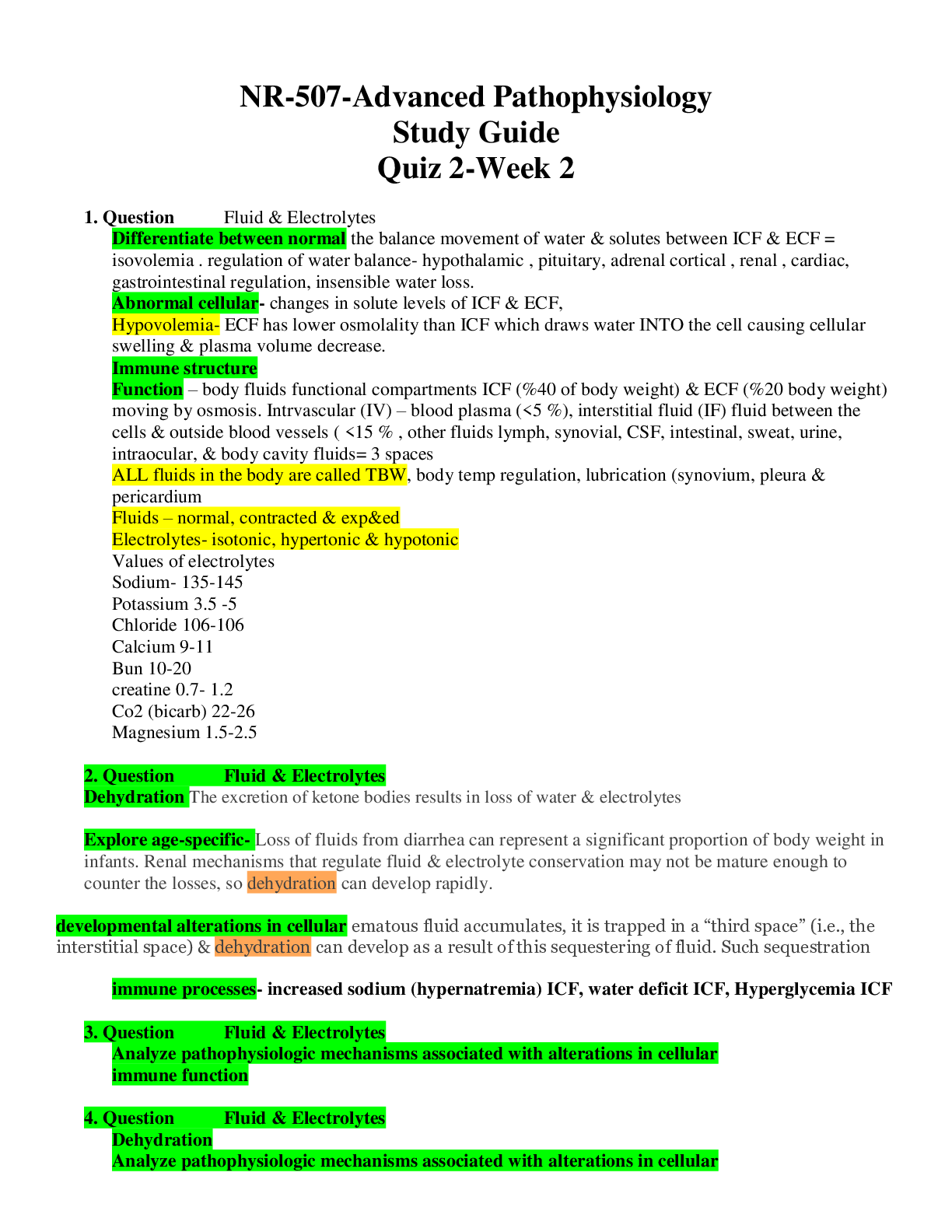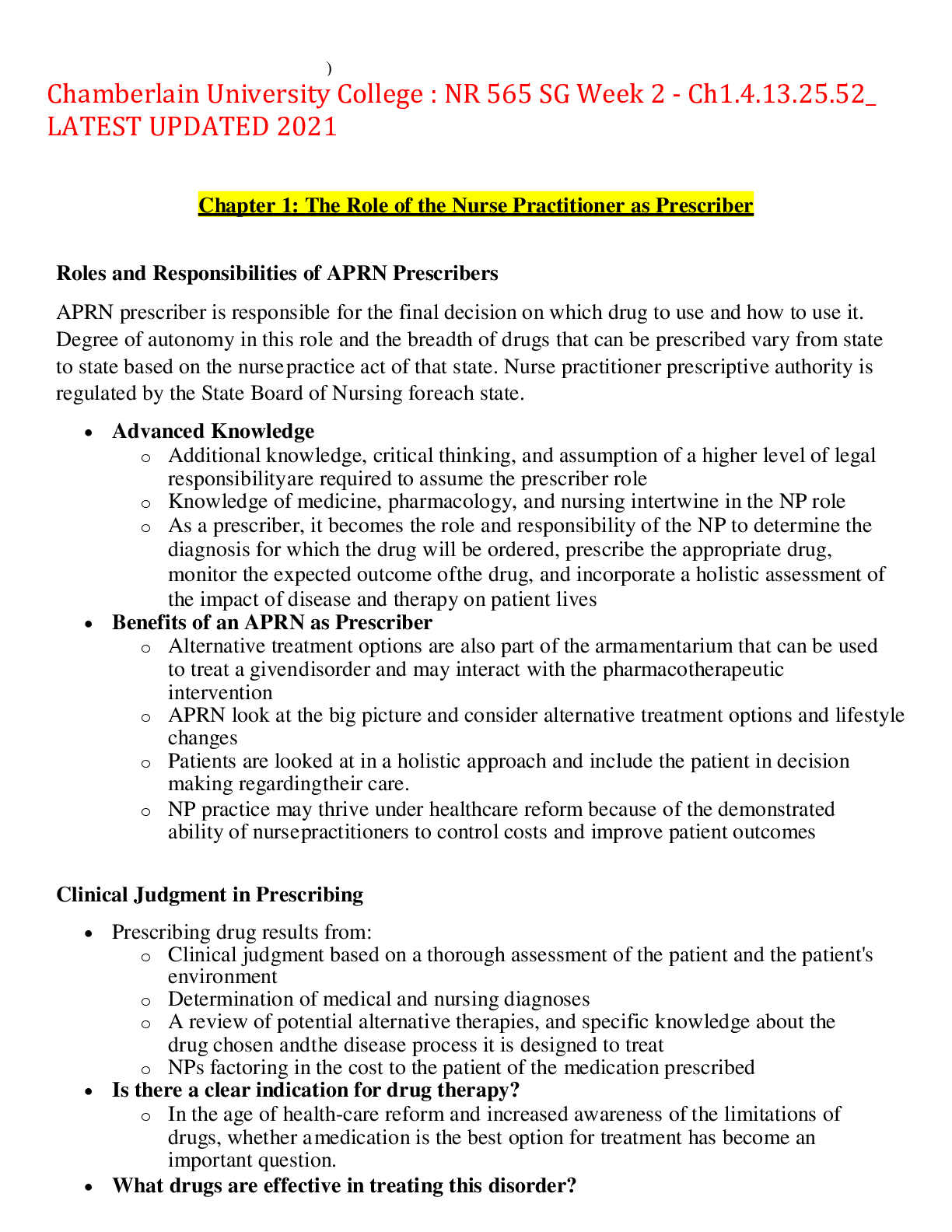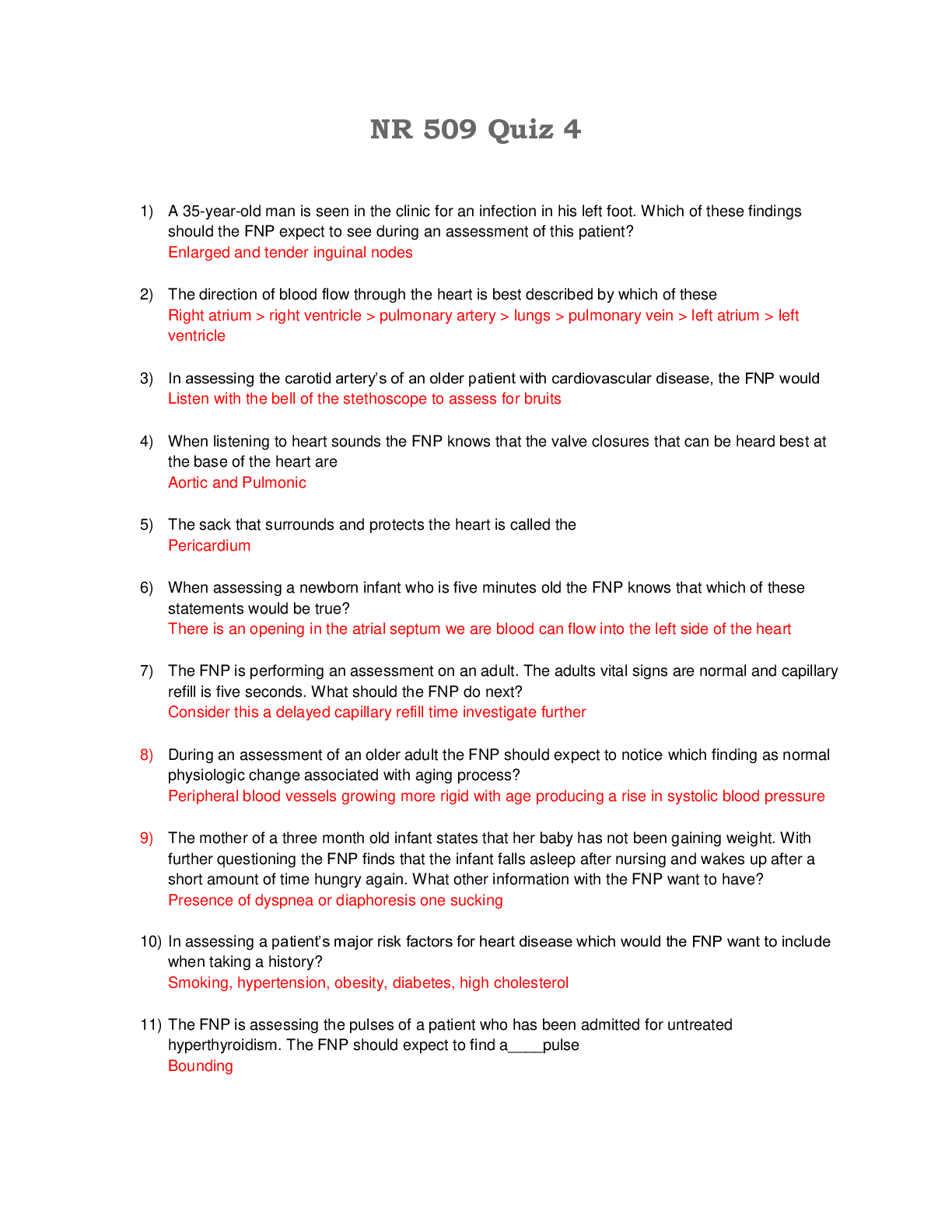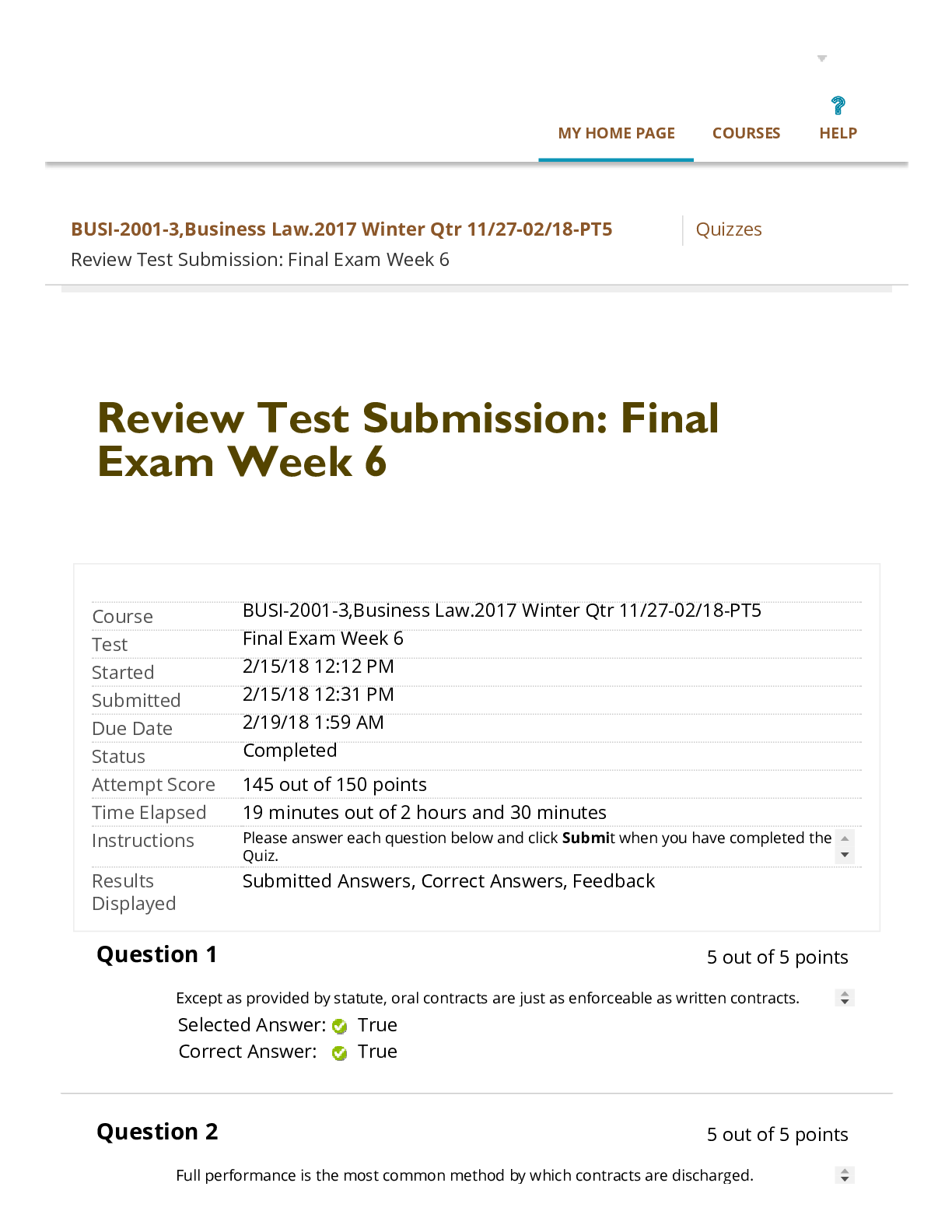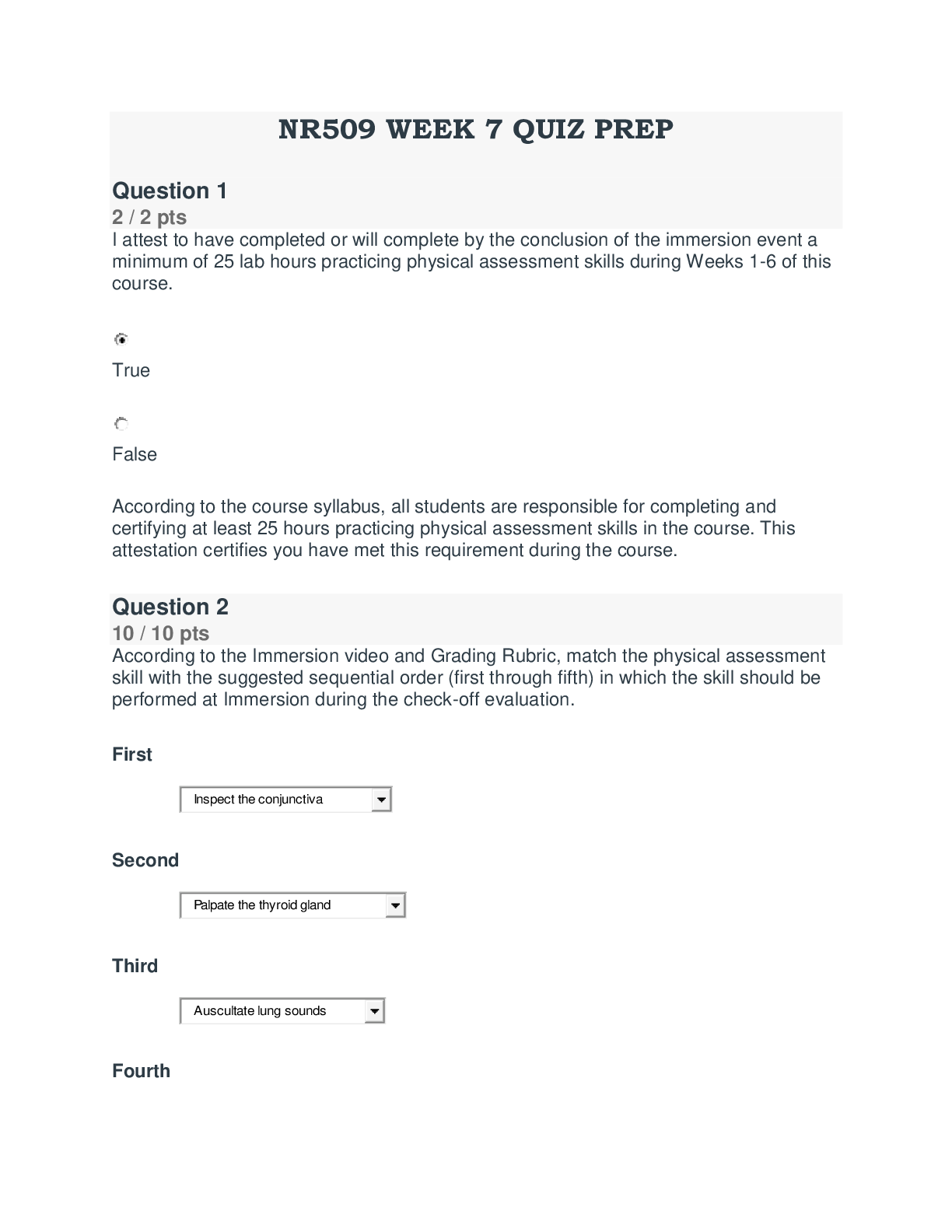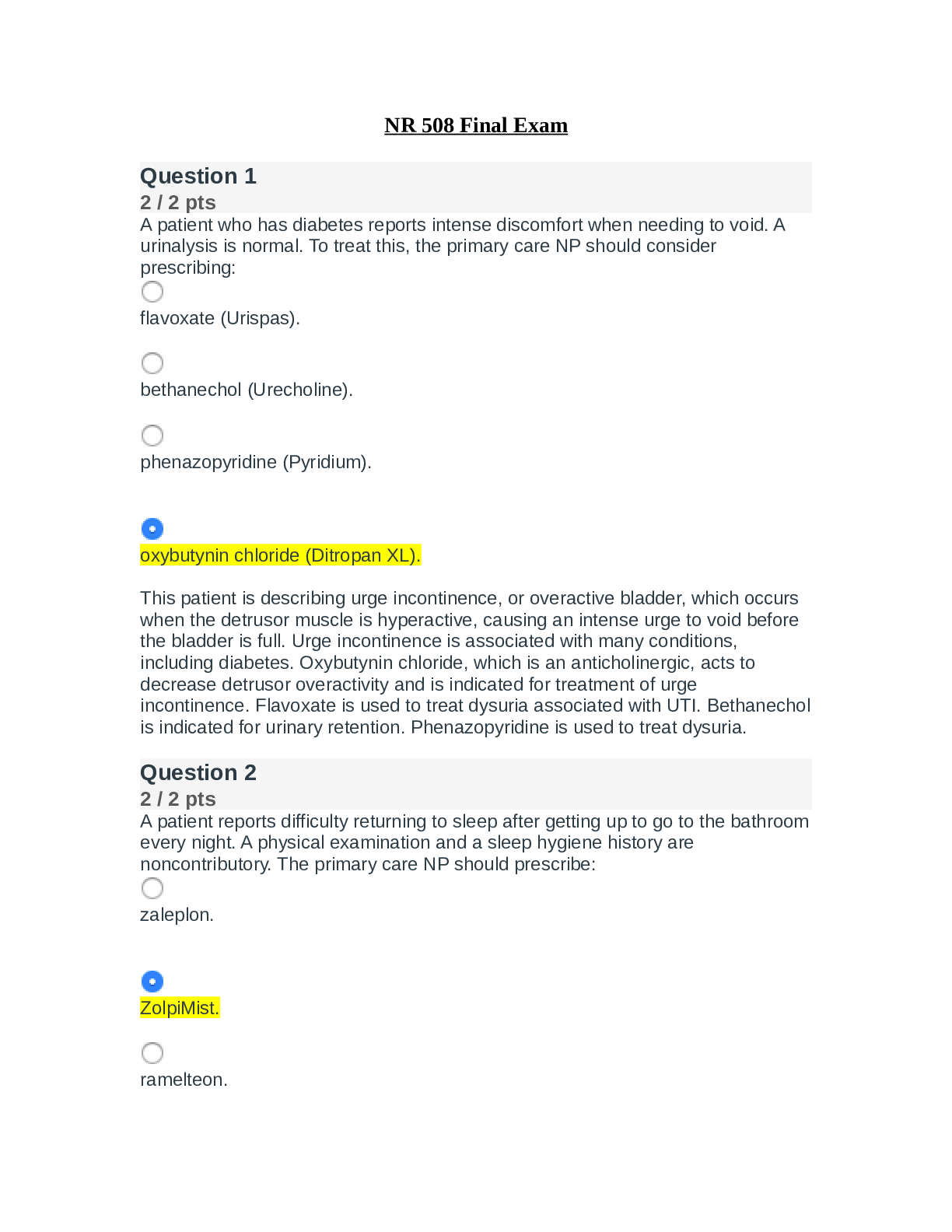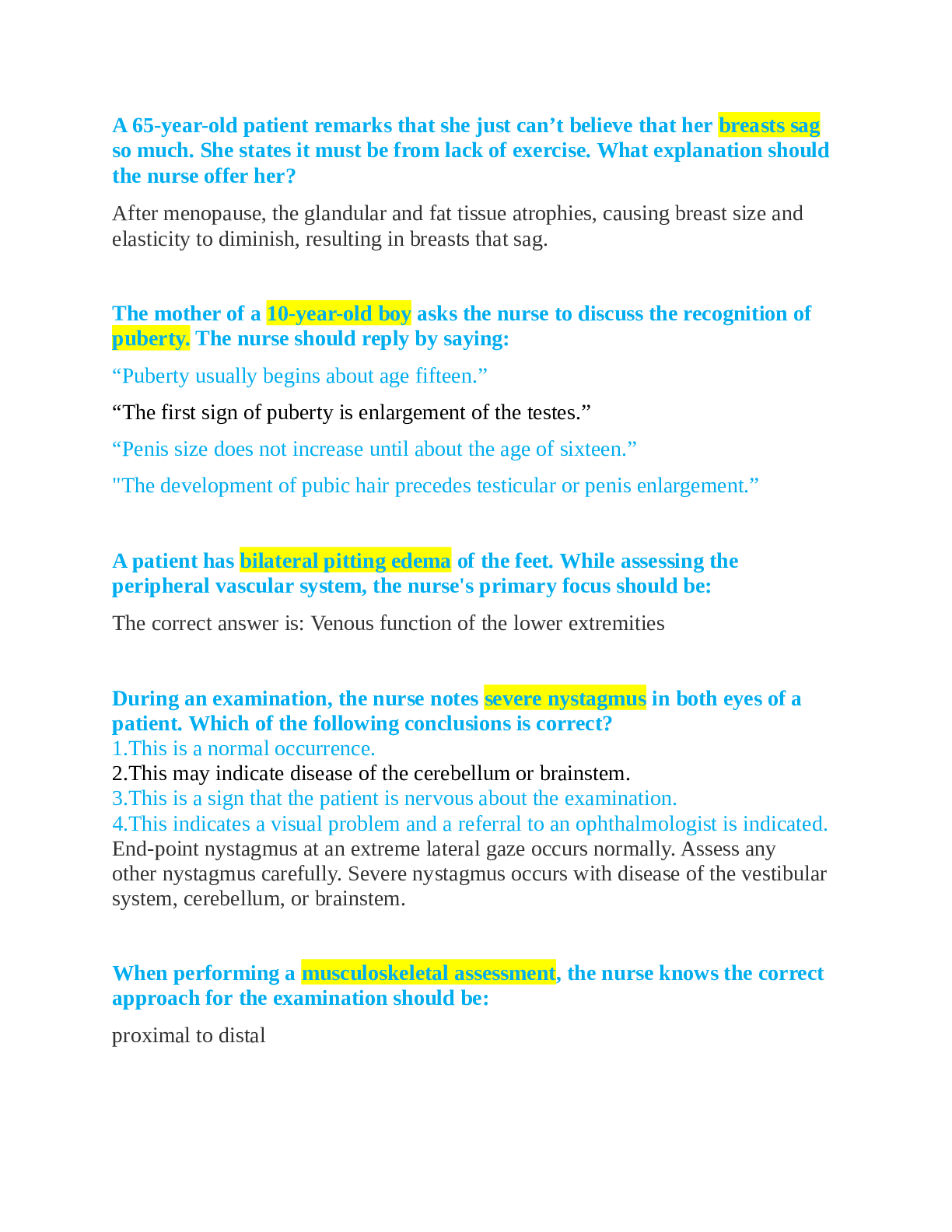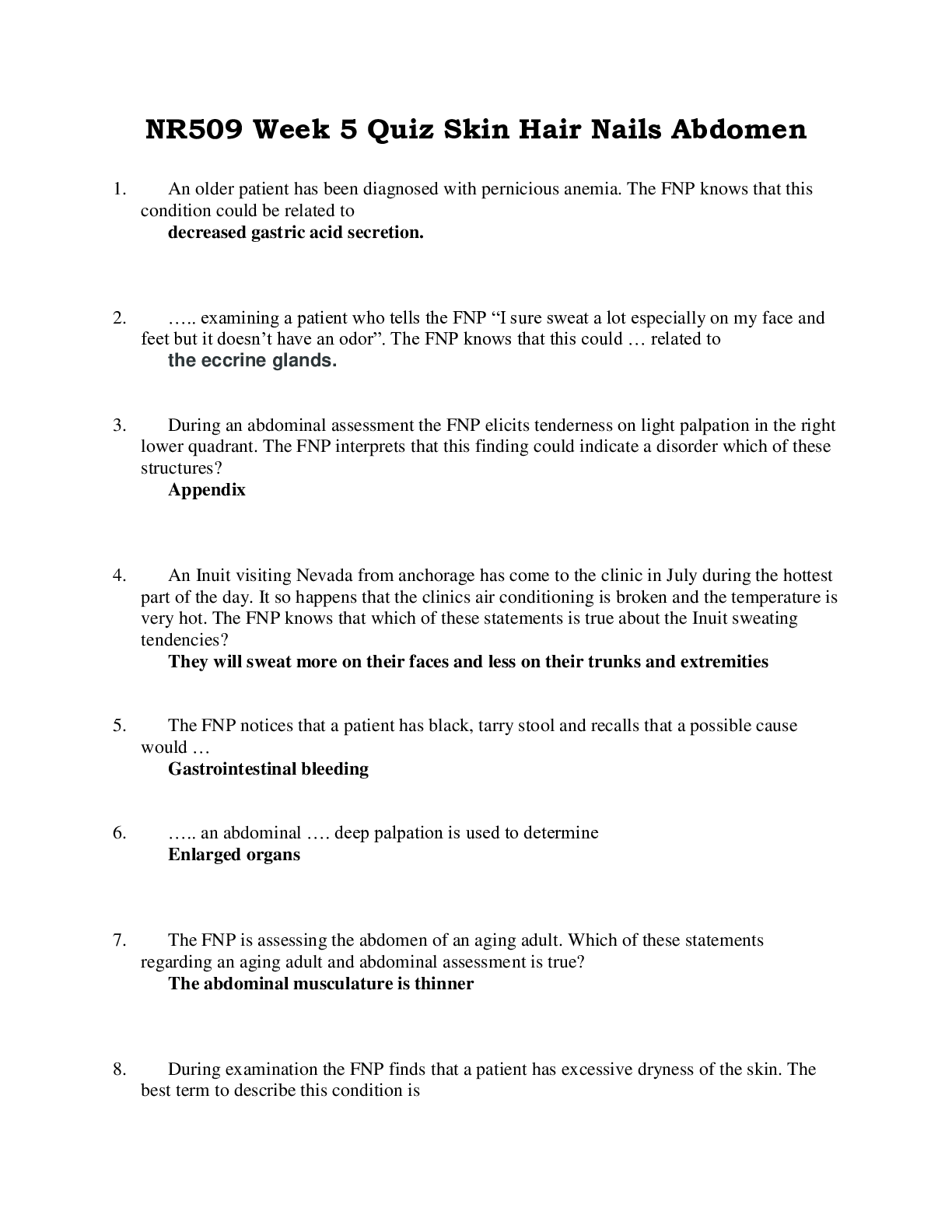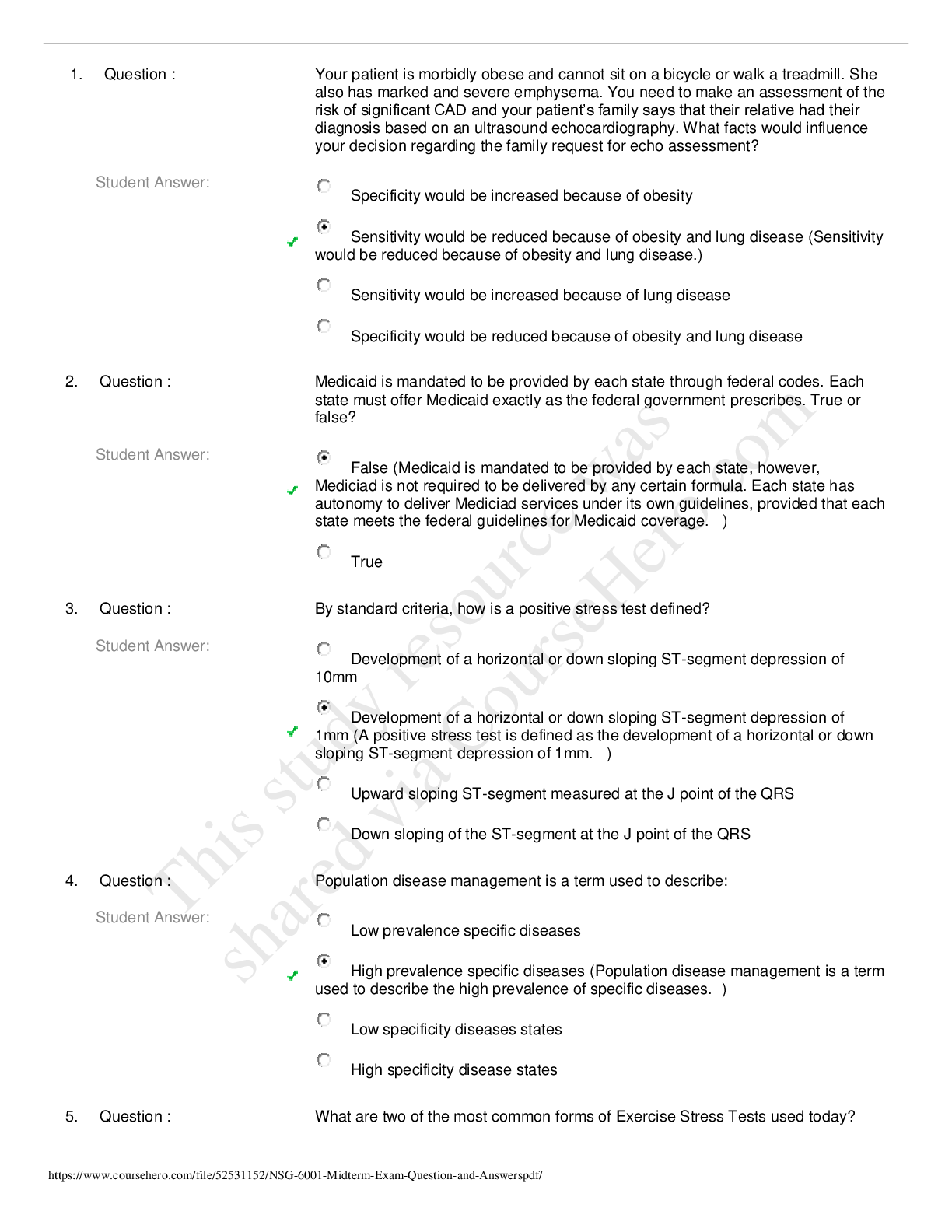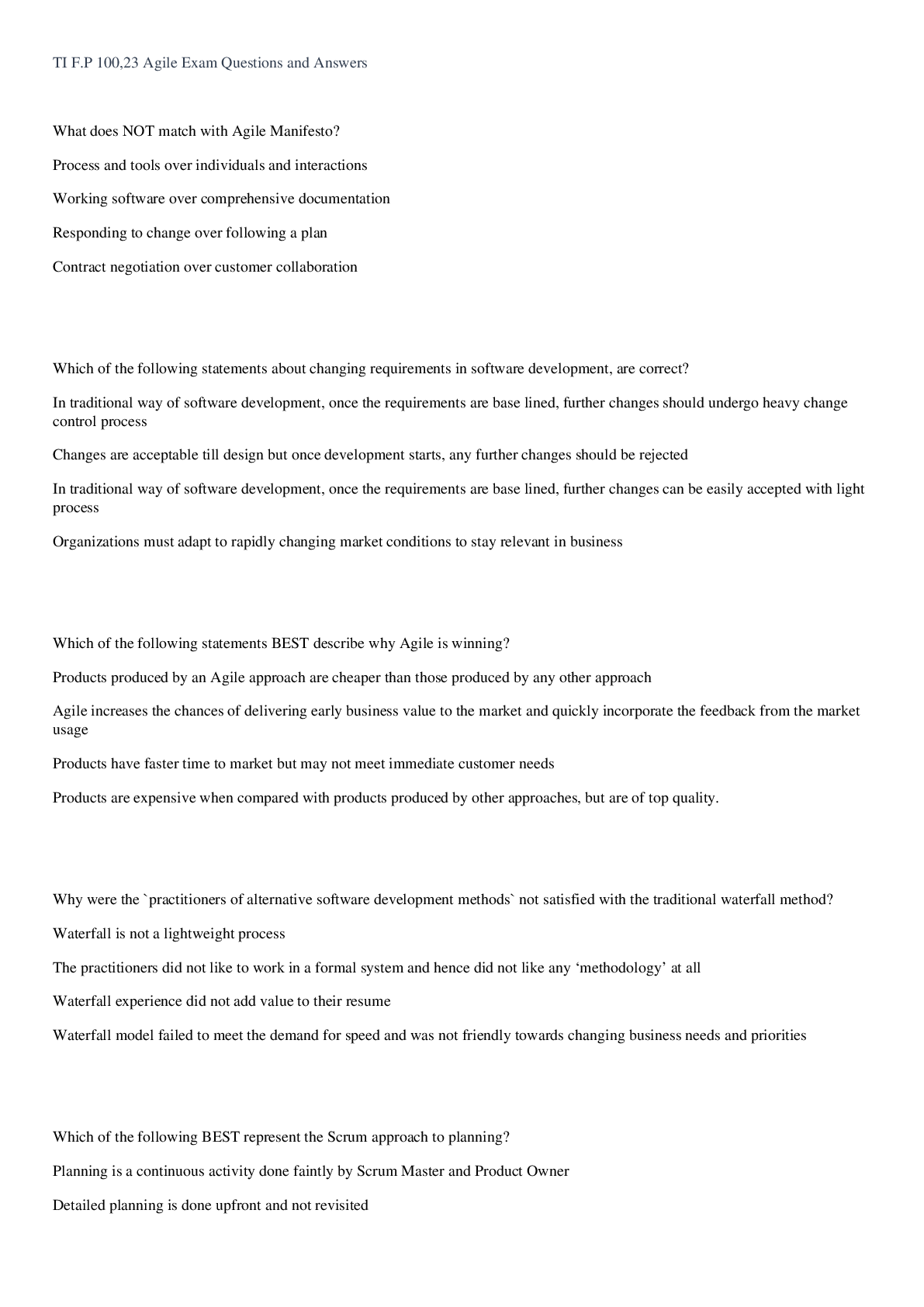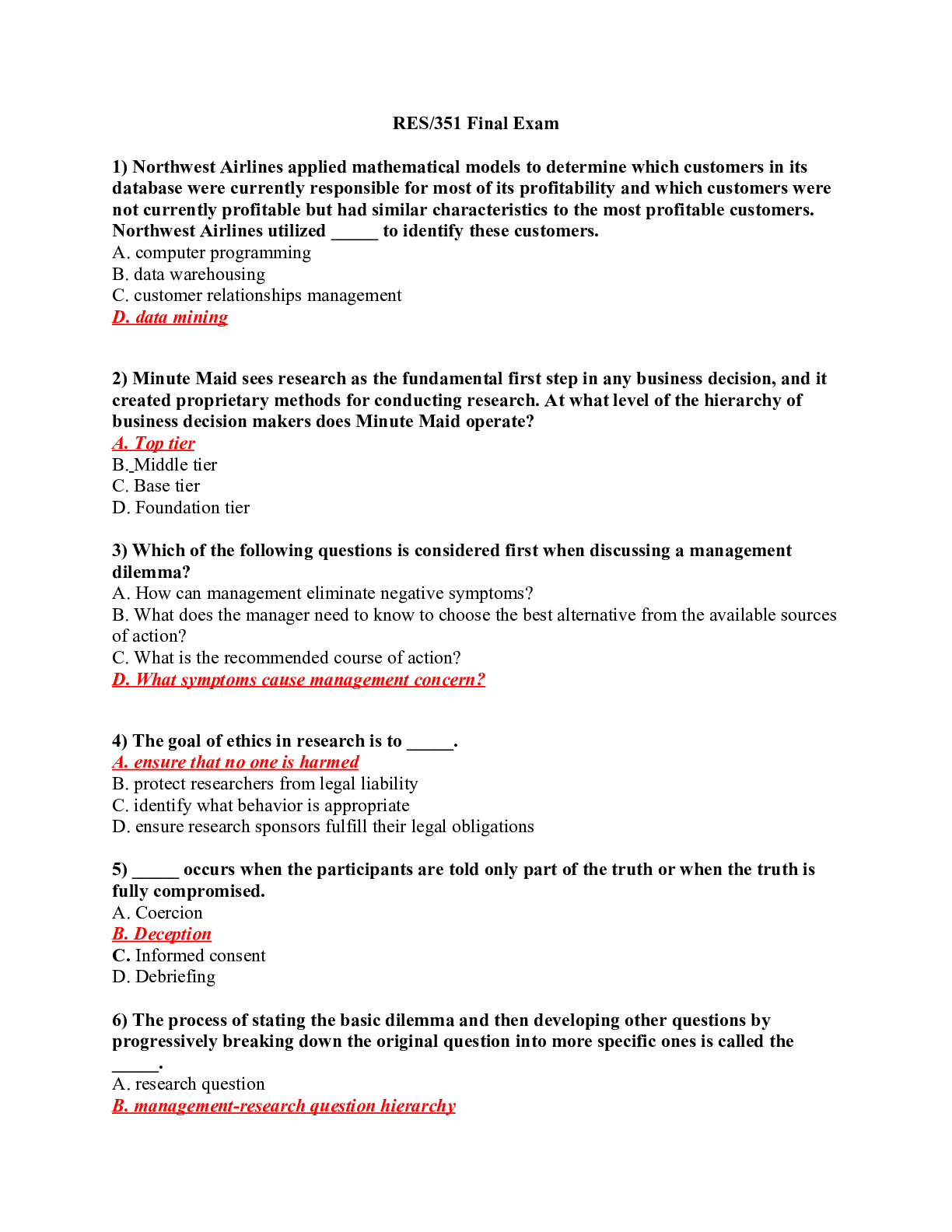HIST 101 Final Exam latest////
Document Content and Description Below
Question 1 By the 1740s, a growing proportion of Chesapeake slaves Selected Answer: All of the above. Answers: were American-born. had established families. created personal lives. All of the ab... ove. Question 2 In 1712, a major slave rebellion occurred in Selected Answer: New York, New York. Answers: Charleston, South Carolina. New York, New York. Boston, Massachusetts. Baltimore, Maryland. Question 3 The social structure of American colonial cities from 1690 to 1770 was influenced by Selected Answer: an increasing gap between the wealthy and the poor. Answers: an absence of urban poverty. an increasing gap between the wealthy and the poor. steadily declining property values and taxes. the end of colonial warfare. Question 4 Most immigrants to colonial America after 1713 were Selected Answer: slaves and indentured servants. Answers: skilled craftsmen and shopkeepers. sons of wealthy gentry. university-trained Puritans. slaves and indentured servants. Question 5 New Englanders opted for more of a mixed economy than settlers in the middle or southern colonies because in New England Selected Answer: availability and productivity of land was limited. Answers: Native Americans had already cleared and used the land. Puritans forbade the buying of slaves. 1 out of 1 points 1 out of 1 points 1 out of 1 points 1 out of 1 points 1 out of 1 pointsavailability and productivity of land was limited. cultivation of cereal crops was too labor-intensive. Question 6 Compared to her English counterpart, the eighteenth-century northern colonial woman Selected Answer: enjoyed broader legal and property rights. Answers: received fewer chances to marry if divorced or widowed. pursued a daily routine less likely to overlap that of her husband's. enjoyed broader legal and property rights. married at an older age and bore fewer children. Question 7 The typical master in colonial America wished to convert the slave into a(n) Selected Answer: mindless drudge who obeyed every command. Answers: mindless drudge who obeyed every command. loving and faithful member of the plantation family. indentured servant who could look forward to freedom. educated and independent producer of goods. Question 8 France's interior empire in North America Selected Answer: had many settlements that were mixed-race communities. Answers: had many settlements that were mixed-race communities. stressed farming more than trading, missionary work, or military efforts. created an ineffective shield against British expansion. contained no African slaves. Question 9 In 1739 a major slave rebellion broke out in Selected Answer: Stono, South Carolina. Answers: Stono, South Carolina. Roanoke, Virginia. Richmond, Virginia. Boston, Massachusetts. Question 10 Colonial America in the first half of the eighteenth century experienced 1 out of 1 points 1 out of 1 points 1 out of 1 points 1 out of 1 points 1 out of 1 pointsSelected Answer: population growth and economic development. Answers: a narrowing of class differences. loss of local autonomy. continual declines in church membership. population growth and economic development. Question 11 In the Louisiana economy, slaves worked as Selected Answer: All of the above. Answers: rice growers. metal workers. indigo processors. All of the above. Question 12 Which of the following statements concerning immigrants to colonial America during the first half of the eighteenth century is correct Selected Answer: Most German-speaking immigrants settled in Pennsylvania. Answers: Most German-speaking immigrants settled in Pennsylvania. Newly arrived immigrants usually settled in New England. Slave imports fell. Virginia experienced the greatest influx of new settlers. Question 13 For urban artisans in colonial America, Selected Answer: a major goal was economic independence. Answers: New England paid the highest wages. work patterns proved regular and constant. a major goal was economic independence. urban growth and economic expansion guaranteed success. Question 14 All of the following represent theories of Enlightenment thinkers EXCEPT the notion that Selected Answer: God predetermined the contents of the human mind. Answers: scientific laws might be applied to human institutions in order to improve society. systematic investigation would unlock the secrets of the physical universe. 1 out of 1 points 1 out of 1 points 1 out of 1 points 1 out of 1 pointsGod predetermined the contents of the human mind. man could use his reason and thus acquire knowledge. Question 15 The advent of "modern" life occurred first in the seaboard centers of colonial America, including the transition from a Selected Answer: barter to a commercial economy. Answers: contentious to a deferential politics. factory to a skilled craftsman's production of goods. social order based on achievement to one based on status. barter to a commercial economy. Question 16 As a result of extensive contact with European colonizers during the early eighteenth century, Native American tribes of the interior Selected Answer: altered patterns of tribal life and leadership. Answers: altered patterns of tribal life and leadership. adopted the white man's culture and religion. benefited from commercial trade and development. abandoned hunting for subsistence agriculture. Question 17 In contrast to conditions in the English colonies, life in New Spain was characterized by greater Selected Answer: racial intermixture. Answers: sharing of profits with natives. social barriers. racial intermixture. political independence. Question 18 Religious life in the colonies was marked by Selected Answer: scarcity of trained ministers. Answers: tightly organized and disciplined congregations. government compulsion to attend services. scarcity of trained ministers. discrimination against Anglicans. Question 19 1 out of 1 points 1 out of 1 points 1 out of 1 points 1 out of 1 points 1 out of 1 pointsAccording to the entrepreneurial ethos, prosperity resulted from Selected Answer: individual competition. Answers: regulated prices and wages. individual competition. self-denial. quality controls. Question 20 The religious revival known as the Great Awakening Selected Answer: emphasized individual responsibility for conversion. Answers: helped prevent revolutionary thought and behavior. reaffirmed traditional sources of authority. emphasized individual responsibility for conversion. affected the colonies equally and simultaneously. Question 21 The population of the colonies had surpassed one million people by 1750, most of whom had spread deep into the interior beyond the Appalachian Mountains. Selected Answer: False Answers: True False Question 22 In the 1750s, the concept that slavery violated the Enlightenment's emphasis on human equality began to grow. Selected Answer: True Answers: True False Question 23 During the latter part of the seventeenth century, King Louis XIV attempted to make __________ the most powerful nation in Europe and to expand its empire in the New World. Selected Answer: france Correct Answer: Evaluation Method Correct Answer Case Sensitivity Exact Match France Question 24 Benjamin Franklin's popular work, __________ , next to the Bible, was the most widely read book in the colonies, containing quips, adages, and homespun philosophy. Selected Answer: Poor Richard's Almanack Correct Answer: 1 out of 1 points 1 out of 1 points 1 out of 1 points 1 out of 1 points 1 out of 1 pointsEvaluation Method Correct Answer Case Sensitivity Exact Match Poor Richard's Almanack Exact Match Poor Richard's Almanac Exact Match Poor Richards Almanack Exact Match Poor Richards Almanac Question 25 Popular __________ in British North America seldom faced effective police power. Selected Answer: cities Correct Answer: Evaluation Method Correct Answer Case Sensitivity Exact Match protests Question 26 Discuss the factors that contributed to a population explosion in North America from 1680 to 1750. How and why did immigrants of the eighteenth century differ from those of the previous century? Did America prove to be their land of opportunity? Selected Answer: Between 1680 and 1750 population jumped from 150,000 settlers in 1680 to more than one million come about the end of 1700s. Talk about an explosion. A high marriage rate, large families, lower mortality, and heavy immigration accounted for much of the population boom. The way people lived hard change dramatically throughout. The north became a farming society, the south became the plantation society, and large cities became the urban society. Even though the centuries share many key aspects, things were changing, the gap between the rich and poor was growing, class difference were becoming more apparent. But, this was a land of opportunity and the opportunities were there. Correct Answer: The population explosion in North America from 1680 to 1750 was fed from both internal and external sources. Among whites, a higher marriage rate, larger families, and lower mortality rate than in Europe prevailed by the 1720s. Immigrants of this era arrived from Germany, Switzerland, Ireland, and Africa rather than England, and they were mostly indentured servants and slaves. Only a small proportion of the eighteenth-century arrivals achieved their dream of becoming independent landholders. Question 27 Who were the Regulators? Selected Answer: frustrated farmers in North Carolina Answers: frustrated farmers in North Carolina upset urban workers in Boston angry Native Americans in Ohio vengeful planters in South Carolina Question 28 Americans objected to the Tea Act of 1773 because it would Selected Answer: make it difficult for American merchants to compete with British merchants. Answers: raise the price of tea in America. 0 out of 1 points 5 out of 5 points 1 out of 1 points 1 out of 1 pointsmake it difficult for American merchants to compete with British merchants. increase Parliament's taxation of tea. bankrupt the popular East India Company. Question 29 Why did violence flare up in the Hudson River Valley during the 1750s and 1760s? Selected Answer: Tenants challenged elite landlords over evictions. Answers: Tenants challenged elite landlords over evictions. Native Americans burned settler homes over land issues. African American slaves confiscated white-owned plantations. The Spanish royal government sent troops against British colonial tax evaders. Question 30 Who were the major social groups during the Revolution other than elites? Selected Answer: All of the above. Answers: the urban working class the rural farming class women and evangelicals All of the above. Question 31 The British Proclamation of 1763 Selected Answer: ordered colonial governors to reserve lands west of the Appalachian Mountains for Indian nations. Answers: ordered colonial governors to reserve lands west of the Appalachian Mountains for Indian nations. allowed western Indians the right to trade with any European merchants. successfully ended an attempt by Ottawa Indians to drive the British out of the Ohio Valley. ended reckless speculation in western lands by eastern investors. Question 32 Americans viewed English policies after 1763 as Selected Answer: All of the above. Answers: threats to their economic interests. evidence of English corruption. a systematic attack on their constitutional liberties. All of the above. 1 out of 1 points 1 out of 1 points 1 out of 1 points 1 out of 1 pointsQuestion 33 England declared war on Spain in 1739 because of a desire to Selected Answer: dominate trade in the Atlantic basin. Answers: win commercial privileges from its ally France. avenge Spanish piracy of English merchant ships. end Spanish involvement in smuggling activities. dominate trade in the Atlantic basin. Question 34 The Boston Massacre, in which five townspeople were killed by British redcoats, Selected Answer: convinced Governor Hutchinson to order British troops out of town. Answers: resulted in a speedy conviction and execution of the soldiers. demonstrated the calculated desire of the British to crush colonial rebellion. convinced Governor Hutchinson to order British troops out of town. galvanized the colonies into further resistance to English policies. Question 35 During the 1760s and 1770s, urban artisans in America Selected Answer: used political discontent to demand internal reforms. Answers: used political discontent to demand internal reforms. opposed revolutionary agitation against England. feared political protests might provoke retaliation by powerful merchants. degenerated into radical and unruly mobs. Question 36 Which of the following colonial leaders argued for defiance of Parliament's Coercive Acts in the Continental Congress? Selected Answer: All of the above. Answers: Patrick Henry Richard Henry Lee Samuel Adams All of the above. Question 37 Following the Glorious Revolution of 1688, England Selected Answer: tightened imperial controls over its American empire. Answers: tightened imperial controls over its American empire. 1 out of 1 points 1 out of 1 points 1 out of 1 points 1 out of 1 points 1 out of 1 pointsentered a political alliance with France. forbade colonial merchants the right to engage in foreign trade. relaxed customs regulations and reduced duties. Question 38 The ideology of revolutionary republicanism Selected Answer: borrowed ideas from English political thought and Enlightenment theories. Answers: originated in the struggle of American colonists against imperial despotism. borrowed ideas from English political thought and Enlightenment theories. reflected common colonial interests and experiences. provided a coherent doctrine to which all colonists could subscribe. Question 39 By 1760 the American colonies had a population of Selected Answer: 1.75 million. Answers: 3 million. 2 million. 1.75 million. 1 million. Question 40 The struggle with England over colonial rights between 1764 and 1776 revealed that Selected Answer: colonial society was not unified. Answers: newer immigrants held more conservative views. over time people tend to grow tired of politics. colonial society was not unified. colonial merchants sided with their British counterparts. Question 41 Who replaced Thomas Hutchinson as governor of Massachusetts in 1774? Selected Answer: General Thomas Gage Answers: General George Washington General Thomas Gage Benjamin Franklin King George III Question 42 1 out of 1 points 1 out of 1 points 1 out of 1 points 1 out of 1 points 1 out of 1 pointsThe turning point of the French and Indian War in America occurred when Selected Answer: English Prime Minister William Pitt threw his nation's full military might into the American campaign. Answers: the French won the alliance of the powerful Iroquois Confederacy. General Edward Braddock claimed control of Fort Duquesne. English Prime Minister William Pitt threw his nation's full military might into the American campaign. American representatives approved a plan for intercolonial action. Question 43 General James Wolfe led 5,000 troops who overcame the French in 1759 at Selected Answer: Louisbourg. Answers: Louisbourg. Montreal. New Orleans. Quebec. Question 44 The call for the meeting of a Continental Congress in 1774 came in response to the Selected Answer: Intolerable Acts. Answers: Quartering Act. Townshend Acts. Stamp Act. Intolerable Acts. Question 45 As a result of the Molasses Act of 1733, Selected Answer: New England merchants and shippers gained new respect for royal authority. Answers: New England rum had to be shipped to England before being exported to another country. New England merchants and shippers gained new respect for royal authority. trade between New England and the French West Indies collapsed. many of New England's largest merchants and distillers resorted to smuggling. Question 46 In the republican worldview, governmental power Selected Answer: promoted public virtue. Answers: promoted public virtue. 0 out of 1 points 1 out of 1 points 0 out of 1 points 0 out of 1 pointscontrolled factionalism. maintained order. threatened liberty. Question 47 Cities contained only 5 percent of the colonial population. Selected Answer: True Answers: True False Question 48 The Seven Years' War proved to be one of the most significant wars fought in the New World. Selected Answer: True Answers: True False Question 49 The Philadelphia militia failed to support the radical leaders of the Revolution in the city. Selected Answer: False Answers: True False Question 50 To discuss creation of a colonial union and possible alliance with the Iroquois Indians, colonial representatives met in 1754 at __________ . Selected Answer: Albany, New York Correct Answer: Evaluation Method Correct Answer Case Sensitivity Exact Match Albany Exact Match Albany, New York Exact Match Albany, NY Exact Match Albany New York Exact Match Albany NY Question 51 At Fort Duquesne, the French rebuffed the attempts of young Virginia militia colonel __________ to establish an English fort at the forks of the Ohio River. Selected Answer: George Washington Correct Answer: Evaluation Method Correct Answer Case Sensitivity Exact Match George Washington 1 out of 1 points 1 out of 1 points 1 out of 1 points 1 out of 1 points 1 out of 1 pointsQuestion 52 Discuss the causes and important developments of the Seven Years' War in North America. Analyze the consequences of the war for the various "winners" and "losers." Selected Answer: Causes: The desire of both France and Britain to control Fur Trade. A clash at the Ohio River Valley. Most important development: The British take-over of French strongholds. Winners: Britain. Resulting in no real consequences, not immediate at least. The end of the Seven Years War was a change of tides, Britain had now replaced France as the leading world power. The war was costly, though, result in more taxes, which in a way leads to the American Revolution. A vengeful France would manifest significant aid for the Revolution. Losers: France and Indians. This would result in severe consequences. The French would have to give up anything they've laid claim to in the New World, except New Orleans. This in itself ended any hope of France creating a New World empire in America, resulting in a huge loss of power. The tribes lost a powerful ally and a way to combat the ever advancing British from their territories. Correct Answer: English colonial penetration of the Ohio Valley provoked French resistance in 1754. Although the French dominated during the early years of war, William Pitt as England's prime minister was committed to winning. English victory in 1763 removed French and Spanish threats to eastern North America, but resulted in heavy debts and increased administrative problems. The end of European rivalry harmed the trading position of interior Indians and left them hostile to further English advances, while American colonists anticipated westward expansion and relished a sense of American identity. Question 53 As the Revolutionary War lengthened and its costs increased, which of the following groups would have been LEAST likely to contribute soldiers for the cause? Selected Answer: men of wealth and influence Answers: men of wealth and influence former indentured servants recently arrived immigrants unskilled manual laborers Question 54 George Washington's early military setbacks convinced him to Selected Answer: harass the British, making the war as costly for them as possible. Answers: engage the British in frontal combat. harass the British, making the war as costly for them as possible. lead an assault on Canada. seek a final attempt at reconciliation with the British. Question 55 Britain established its military headquarters in New York City in 1776 because of the city's Selected Answer: All of the above. Answers: access to food supplies. 5 out of 5 points 1 out of 1 points 1 out of 1 points 1 out of 1 pointscentral location. Loyalist sentiments. All of the above. Question 56 The British invasion of the southern states was complicated by the Selected Answer: colonial use of local knowledge and unconventional tactics. Answers: absence of Loyalist supporters. jagged coastline and numerous inland rivers. colonial use of local knowledge and unconventional tactics. presence of a large slave population. Question 57 Who took advantage of the confusion and chaos of war in Georgia and the Carolinas? Selected Answer: African American slaves Answers: Native American families African American slaves private bands of marauders French police Question 58 The punishment of Loyalists during the Revolution Selected Answer: raised concerns over the protection of individual liberty. Answers: gained the support of the most conservative patriots. raised concerns over the protection of individual liberty. typically fell hardest upon members of the lower classes. was tempered by feelings of kinship and affection. Question 59 During the Revolutionary War, George Washington repeatedly criticized the Continental Congress for Selected Answer: failing to support the army. Answers: blocking needed imports. forming an alliance with France. being soft on land speculators. failing to support the army. Question 60 1 out of 1 points 1 out of 1 points 1 out of 1 points 1 out of 1 points 1 out of 1 pointsIn response to the Revolution, the Cherokee Indians Selected Answer: launched raids in eastern Tennessee. Answers: launched raids in eastern Tennessee. joined Americans in a military alliance. remained aloof from the conflict. fled the fighting to lands west of the Mississippi River. Question 61 The ability of the Confederation Congress to function was limited by the stipulation that Selected Answer: each state's delegation could cast but one vote. Answers: all war powers belonged to the executive branch. any proposed law required unanimous approval. each state's delegation could cast but one vote. it could not pass resolutions nor seek state support. Question 62 Actual fighting in the American Revolution began when the Selected Answer: British army, sent to seize colonial arms, was interrupted by colonists at Lexington. Answers: British army, sent to seize colonial arms, was interrupted by colonists at Lexington. British navy shelled the colonial port of Norfolk, Virginia. colonial army under Washington forced the British to evacuate Boston. colonial Minutemen attacked a British camp guarding an arsenal in Concord. Question 63 During the first year of the Revolution in New England, the Selected Answer: British decided to evacuate Boston. Answers: British decided to evacuate Boston. numbers and influence of Loyalists increased. numbers of army recruits steadily declined. residents experienced widespread loss of life and property. Question 64 Which of the following tribes controlled the southern interior? Selected Answer: All of the above. Answers: Cherokee Creek 1 out of 1 points 1 out of 1 points 1 out of 1 points 1 out of 1 pointsChoctaw All of the above. Question 65 After the war, the generation of Americans who fought the Revolutionary War Selected Answer: became passionately absorbed by political debates. Answers: preferred European to American newspapers. became passionately absorbed by political debates. focused on private rather than public affairs. rejected religious notions of the nation's destiny. Question 66 During the American Revolution, the state militias Selected Answer: provided an effective fighting force at the beginning of the war. Answers: increasingly attracted volunteer recruits as the war went on. served to legitimate the war among the people. never attracted any but the poorest class of men. provided an effective fighting force at the beginning of the war. Question 67 American Loyalists during the Revolution Selected Answer: were most numerous around New York City. Answers: lived mostly in and around the city of Boston. received generous compensation from England for their losses. numbered fewer than 10,000 people. were most numerous around New York City. Question 68 Loyalist emigrants established successful lives in all the following places EXCEPT Selected Answer: land west of the Appalachians. Answers: land west of the Appalachians. Canadian Maritime Provinces. England. British West Indies. Question 69 Many black American slaves sought their freedom during the Revolution by 1 out of 1 points 0 out of 1 points 1 out of 1 points 1 out of 1 points 0 out of 1 pointsSelected Answer: fighting for the British. Answers: seeking refuge among the Indians. petitioning state legislatures for their freedom. fighting for the British. All of the above. Question 70 The medical treatment soldiers received Selected Answer: often did more harm than good. Answers: often did more harm than good. kept deaths from disease lower than deaths in battle. was good by modern standards. was nearly non-existent. Question 71 Intending on pushing further into the South, British commanders realized that Selected Answer: All of the above. Answers: the distance was too far. supply lines would be too long. Loyalist sympathy was weak. All of the above. Question 72 Britain lost the Revolutionary War because it Selected Answer: failed to capitalize sufficiently on its advantages. Answers: pursued overly aggressive military strategies. failed to capitalize sufficiently on its advantages. abandoned traditional European battlefield tactics. proved economically inferior to the combined American states. Question 73 Very few American soldiers were immigrants. Selected Answer: True Answers: True False Question 74 France entered the American Revolutionary War on the American side in 1778. 1 out of 1 points 1 out of 1 points 1 out of 1 points 0 out of 1 points 1 out of 1 pointsSelected Answer: True Answers: True False Question 75 The American Revolution gave rise to the idea of separating __________ and state. Selected Answer: Church Correct Answer: Evaluation Method Correct Answer Case Sensitivity Exact Match church Question 76 William Patterson's idea for a new national government was known as the __________ Plan. Selected Answer: New Jersey Correct Answer: Evaluation Method Correct Answer Case Sensitivity Exact Match New Jersey Exact Match New Jersey Plan Question 77 Loyalist numbers were fewest in __________ , and concentrated around New York City. Selected Answer: New England Correct Answer: Evaluation Method Correct Answer Case Sensitivity Exact Match New England Question 78 Discuss the difficulties Americans faced in raising, equipping, and maintaining an army. Selected Answer: It is actually astounding that we made it through this conflict because The Continental Congress had no authority to raise an army. We had no means to supply and support a war of such magnitude. State, nor Congress could effectively administer a war effort such a size. This war had to be funded and the only way that could have happened was through high taxation. The troops themselves just weren't prepared for all that war had to offer. The British were an experienced army. The Americans had no such training at the beginning of the war and lacked discipline. It took some amount of training to stand in the battle line and resist a professional bayonet charge without breaking and running for the hills. Morale, in the beginning, was high, but steadily declined. The days of war had taken their toll. This then became the sad tale of a rich man's war, poor man's blood. Correct Answer: At the war's beginning, men of all ranks enlisted in their state militias and the continental army. Throughout the war, both the states and Congress failed to provide sufficient food, clothing, and supplies. Recruitment became more difficult as the war progressed. Question 79 The Iroquois, in particular, resisted white Selected Answer: 1 out of 1 points 1 out of 1 points 1 out of 1 points 5 out of 5 points 1 out of 1 pointsChristianity Answers: disease. Christianity loss of traditional life ways. lack of self-confidence. Question 80 New Orleans was originally a colony of the Selected Answer: French. Answers: French. Spanish. British. Dutch. Question 81 By 1820, the population of New York numbered _______ people. Selected Answer: 100,000 Answers: 50,000 75,000 100,000 200,000 Question 82 The Indian Intercourse Act of 1790 dealt with Selected Answer: federal treaties and Indian land. Answers: federal treaties and Indian land. marriage rights on tribal land. religious ceremonies in cities. water rights for immigrant people. Question 83 Indians who assimilated more than most included the Selected Answer: Sioux. Answers: Sioux. Cherokee Navajo. Hopi. 1 out of 1 points 1 out of 1 points 1 out of 1 points 0 out of 1 pointsQuestion 84 By 1800, the average size of American farms was _______ acres. Selected Answer: 150-100 Answers: 500-1,000 300-400 200-300 150-100 Question 85 By the 1820s, how many African Americans lived in eastern port cities Selected Answer: 40,000 Answers: 50,000 40,000 30,000 20,000 10,000 Question 86 In the early 1800s, one of the most important southern exports was Selected Answer: cotton. Answers: bananas. coal. cotton. porcelain. Question 87 In 1808, the Cherokee adopted a legal code combining Indian and Selected Answer: U.S. law. Answers: Spanish law. British law. U.S. law. French. Question 88 In February 1791, Congress made a new tax law known as the Selected Answer: Whiskey Tax Answers: Cigarette Tax. 1 out of 1 points 1 out of 1 points 1 out of 1 points 1 out of 1 points 1 out of 1 pointsWhiskey Tax Corn Tax Rice Tax. Question 89 Washington's first Secretary of the Treasury was Selected Answer: Alexander Hamilton Answers: Thomas Jefferson. Benjamin Franklin Alexander Hamilton James Madison. Question 90 In 1794, the United States won a decisive battle against Native Americans at the Battle of Selected Answer: Fallen Timbers. Answers: Handsome Lake. Running Waters. Fallen Timbers. Ocean Shore. Question 91 In the 1780s, a Native American leader who resisted white expansion was Selected Answer: Little Turtle. Answers: Captain Jack. Little Turtle. Geronimo. Sacajawea. Question 92 By the 1820s, Philadelphia was becoming a center of ______ production. Selected Answer: textile Answers: slavery tobacco textile lumber Question 93 1 out of 1 points 1 out of 1 points 1 out of 1 points 1 out of 1 points 1 out of 1 pointsBy 1800, much of southern agriculture was Selected Answer: in disarray. Answers: rapidly expanding. in disarray. farmed by free blacks. burned over by fire. Question 94 Early American cities witnessed most Americans ________ to work. Selected Answer: walking Answers: walking riding horses riding in wagons taking public trains Question 95 In the early 1800s, slaves were imported into, Georgia and Selected Answer: South Carolina. Answers: South Carolina. Virginia. Maryland. New York. Question 96 Streets in early American cities Selected Answer: were filthy and maintained by swine. Answers: were swept clean daily by city workers. remained untouched by humans and animals. were filthy and maintained by swine. were nonexistent. Question 97 Economic policy under President Washington was largely carried out by Selected Answer: Alexander Hamilton. Answers: George Mason. Thomas Jefferson. John Jay. Alexander Hamilton. 1 out of 1 points 1 out of 1 points 1 out of 1 points 1 out of 1 pointsQuestion 98 Which of the following nations closed the Mississippi River to U.S. shipping? Selected Answer: Spain Answers: France Britain Germany Spain Question 99 The Second Great Awakening was confined to New England. Selected Answer: False Answers: True False Question 100 Human travel was the only means of mass communication across space in the early American Republic. Selected Answer: True Answers: True False Question 101 The number of newspapers steadily decreased over time in the early United States. Selected Answer: False Answers: True False Question 102 President James Madison launched a __________ network of roads and canals. Selected Answer: internal improvements Correct Answer: Evaluation Method Correct Answer Case Sensitivity Exact Match federally subsidized Exact Match subsidized Question 103 In the case of __________ (1816), the Court claimed appellate jurisdiction over the decisions of state courts. Selected Answer: Martin v. Hunter's Lessee Correct Answer: Evaluation Method Correct Answer Case Sensitivity Exact Match Martin v. Hunter's Lessee 1 out of 1 points 1 out of 1 points 1 out of 1 points 1 out of 1 points 0 out of 1 points 1 out of 1 pointsQuestion 104 Describe the XYZ affair. Selected Answer: The French, offended by Jay's treaty, began to violate the terms of the Treaty of Alliance with France (Franco-American Treaty) causing it to end. So in response to such, John Adams sent over a commission to negotiate with Talleyrand (French foreign minister). Negotiations weren't so great, the three secret french agents told American delegates that they could meet with the minister only in exchange for a handsome bribe, the US denied. This all led up to Naval Battles between the US and France, this was an undeclared war called Quasi-War. This "war" resulted in an increase in the size of both Navies. But an already pre-occupied France, battling Britain, quickly realized that fighting two fronts probably isn't the best idea. The X Y Z in the name are derived from the secret agents, as made public to Congress by John Adams. This was a chance for us to flex our guns, it made John Adams look strong. Correct Answer: When John Adams assumed office, a crisis between France and the United States over French interference with American vessels took place. Adams sent three commissioners to Paris to resolve the situation. The French dignitaries who received the Americans demanded a loan in the form of a bribe. Adams reported the incident to Congress, and Federalists exploited the affair. 5 out of 5 points [Show More]
Last updated: 1 year ago
Preview 1 out of 23 pages
Instant download
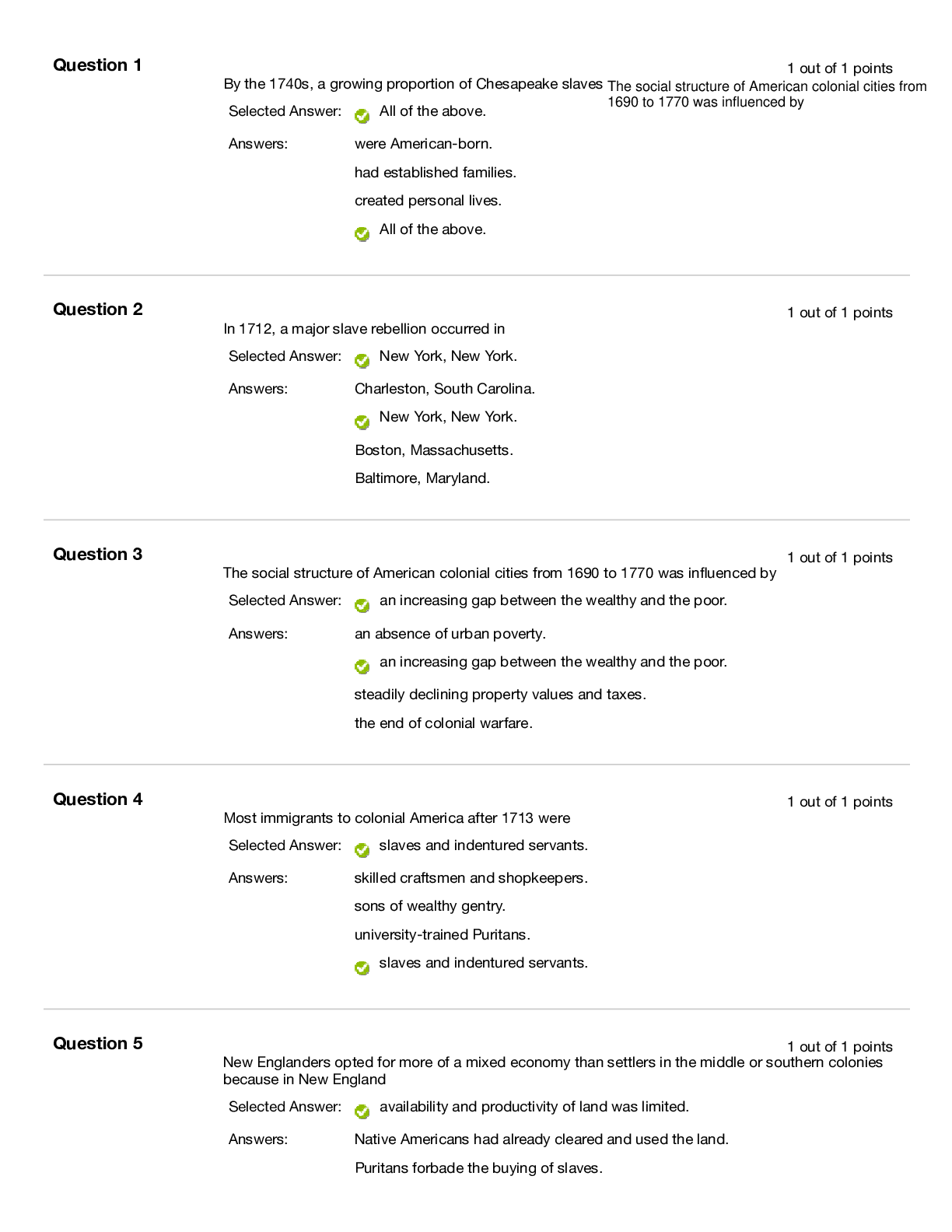
Buy this document to get the full access instantly
Instant Download Access after purchase
Add to cartInstant download
Reviews( 0 )
Document information
Connected school, study & course
About the document
Uploaded On
Apr 25, 2021
Number of pages
23
Written in
Additional information
This document has been written for:
Uploaded
Apr 25, 2021
Downloads
0
Views
56

